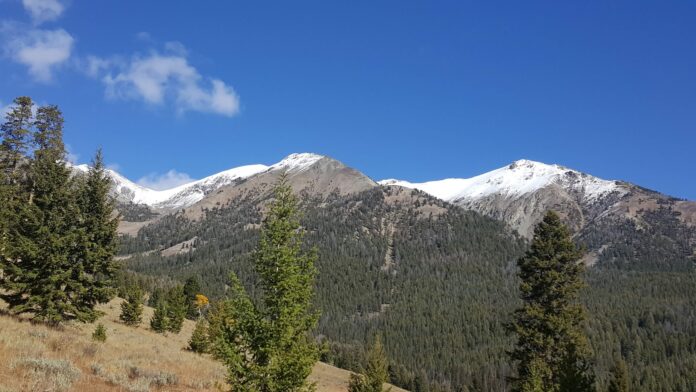BY HARRY WEEKES
Lately, mountains have been on my mind.
In early October, I stood on top of a smallish hill in the Green Mountains marveling at the colorful leaf blanket pulled across the landscape. The temperate deciduous forests of New England are, quite literally, awesome. Watching cloud shadows swim across the canopy interrupted only by the dazzling effects of sun breaking through is stupefying.
“How many leaves do you think we’re looking at?” was about all I could manage to say as we stood and stared across Vermont.
Then, rather quickly and disorientingly (as is made possible by modern travel), I was in the Salt Lake City airport listening to what I call “auditory postcards”—those short snippets of conversation you pick up in public spaces. Two people were referring to skiing and various mountains in the West. Talking about Sun Valley, one person said, simply, “It’s a good mountain.”
Baldy is a good mountain. A familiar mountain. That entity I commonly refer to when I say, “I have lived within five miles of one mountain for 50 years.”
These ideas bounced around my mind, drawing me into my simplified view of the world. This is where I start to think about things and put them into big cartoon categories. The Appalachians and the Rockies. Old mountains and young mountains. East versus West.
So it was that I was musing about mountains when I woke up in a hotel room in Tacoma, Washington, having arrived the night before, to look out my window and see Mount Rainier—a great shadow standing in front of a lightening sky. Oh, that’s right, there are these kinds of mountains, too. Big, explosive ones that live in the imagination of almost everyone, and in the viewshed of millions of people.
I thought the obvious: “That’s a volcano.”
Even alone, I found myself looking around the room asking no one in particular, “What’s it like to grow up next to that?”
There is something about the natural world that delivers almost every time you turn your attention to it. On one hand, the non-human world gives you what you are looking for. I go out to see birds, and I find birds. I go looking for leaves changing, and I find trees and forests in different stages of fall display. On the other hand, though, there is all you were not looking for. And this is where the magic lies.
Most recently I heard this described with the analogy of looking through a telescope—at once, you train your vision on a specific area. Not only do you see more clearly what you are looking at, but you see all the other stuff as well. This is looking at a bird through binoculars to discover its colors, the fact that it is eating little insects off a branch, and that there are other little birds twittering around and with it.
Taking any moment to focus on one thing marvelously opens you up to many more things. Looking at the leaves on the ground, you find a frog. Pausing to look at a blue heron, you see the muskrat. Thinking about mountains, you discover a volcano.
Yep. These are good mountains.
Harry Weekes is the founder and head of school at The Sage School in Hailey. This is his 50th year in the Wood River Valley, where he lives with Hilary and one of their three baby adults—Simon. The other members of the flock, Georgia and Penelope, are currently fledging at Davidson College in North Carolina and Middlebury College in Vermont, respectively.



